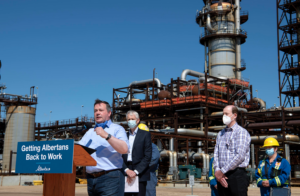
For decades, as our world has warmed, the oil industry has done everything in its power to continue the status quo.
As our ongoing climate emergency increased the need for urgent action, the industry tried to spin its way out of trouble by promoting climate denial and delaying action for as long as possible.
As the evidence became incontrovertible, the industry pushed false solutions that on the surface sound sensible, but actually will never solve our climate crisis.
And central to those false solutions is carbon, capture and storage, known as CCS. We called it a “climate solution mirage.” Last year, OCI published an investigation into CCS, entitled “Carbon Capture: Five Decades of False Hope, Hype, and Hot Air.”
Ten days ago, I blogged about a story on how the U.S. Government had wasted $1 billion on failed CCS projects. But it gets worse.
A new investigation by Global Witness has examined Shell’s Quest CCS project in Canada, which captures the CO2 from Shell’s dirty tar sands operations.
Log on to Shell Canada’s website and it states boldly that the Quest project “shows that large-scale CO2 capture is a safe and effective measure to reduce CO2 emissions from industrial sources.”
The website continues, that “Quest has captured and stored over 5 million tonnes of CO2.” Shell calls this figure a milestone.
But according to Global Witness, the Quest plant “is in fact emitting more than it is capturing.”
Despite having captured 5 million tons of carbon across a five-year period, it has emitted a further 7.5 million tonnes of climate polluting gases during the same time. Each year, Shell’s plant has the same carbon footprint as 1.2 million petrol cars.
The research found that less than fifty percent – 48% – of the plant’s carbon emissions are actually being captured, dropping to 39% when including other greenhouse gas emissions from Shell’s project.
This research “delivers a serious blow to proponents of fossil hydrogen who are pushing for more public funds to support its use,” according to Global Witness. It also makes a mockery of government subsidies, with $654 million of the $1 billion cost of Quest having come from the Canadian government themselves.
“We do think Shell is misleading the public in that sense and only giving us one side of the story,” said Dominic Eagleton, who wrote the report, told Vice news. “Shell has described the carbon capture facility at its Alberta plant as showing that carbon capture technology is an effective way of reducing carbon emissions, whereas our investigation shows that’s clearly not the case,” he continued.
Eagleton called the report a “wake-up call for governments, not just in Canada, but across the world.”
The federal Canadian government is now said to be looking into the findings. Whereas, Shell is arguing that Global Witness’s analysis is “simply wrong.”
Meanwhile, leading climate scientists responded to the Global Witness report. Michael Mann tweeted:
Another nail in the coffin of the technocratic (e.g. "carbon capture will save us") path (https://t.co/qkpjRy56OE) on climate:https://t.co/sO3ED5BwMR
There's only one safe, reliable path forward: Decarbonizing our economy. Now.
— Prof Michael E. Mann (@MichaelEMann) January 24, 2022
Colleagues we work with have been highly critical too:
Carbon capture & storage #CCS don't address the main drivers of the #ClimateEmergency.
These false solutions are pushed by the #FossilFuel industry to divert attention away from the deep systemic changes that are needed to tackle the #ClimateCrisis.https://t.co/Ppbno6gFTu— Center for International Environmental Law (@ciel_tweets) January 25, 2022
Others have weighed into the CCS debate, too. Last week, hundreds of academics and scientists urged Justin Trudeau’s government to avoid rewarding companies who use carbon capture technology.
“We are deeply concerned with the government’s proposal to introduce a new investment tax credit for carbon capture, utilization, and storage,” they wrote.
They continued, “Carbon capture for the oil and gas sector is not a climate solution” and despite the “billions of taxpayer dollars spent by governments globally” on the technology, CCS “has not made a dent in CO2 emissions.”
In contrast, they said Trudeau’s Government “must instead move forward with proven climate solutions such wide-scale use of renewable energy, and intensifying energy efficiency.”

